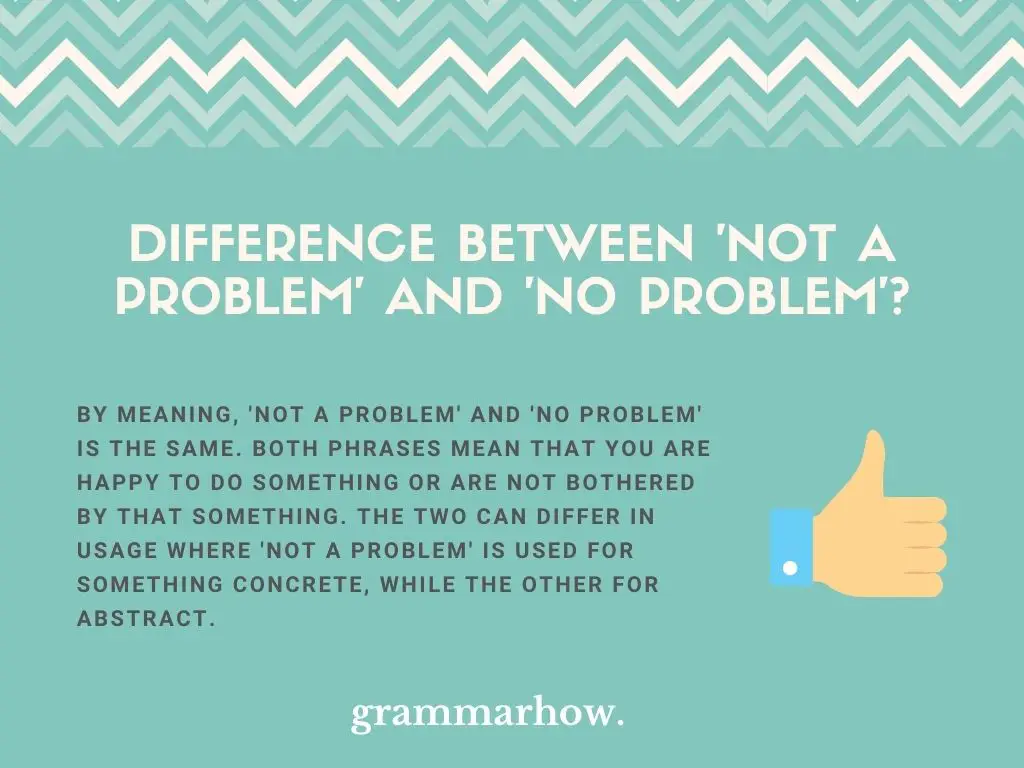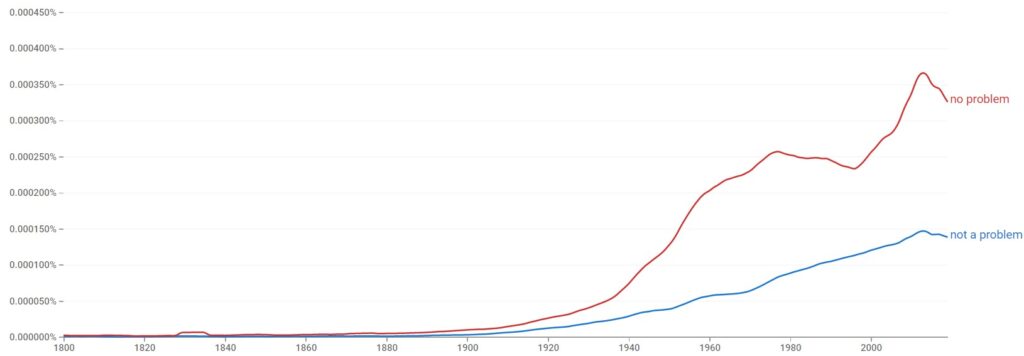Have you ever thought of how simple articles like ‘a,’ ‘an,’ or ‘the’ can change a sentence completely? Or, are you those who believe that these words don’t change anything? Does saying ‘not a problem’ different from ‘no problem?’ Or are they the same? Let’s find out!
What Is The Difference Between ‘Not A Problem’ And ‘No Problem?’
By meaning, ‘not a problem’ and ‘no problem’ is the same. Both phrases mean that you are happy to do something or are not bothered by that something. The two can differ in usage where ‘not a problem’ is used for something concrete, while the other for abstract.

We use ‘not a problem’ to express something concrete, meaning the favor itself is not something that concerns you or is hard for you. On the other hand, we use ‘no problem’ to express something more abstract, meaning that doing the favor is not something that concerns you or is hard for you.
What Does ‘Not A Problem’ Mean?
‘Not a problem’ is a phrase that means you are happy to do something or are not bothered by that something. We use ‘not a problem’ to express something concrete, meaning the activity is not something that concerns you or is hard for you.
We use ‘not a problem’ with concrete nouns. Articles like ‘a,’ quantify, limit, and determine a noun, which you can only do with concrete nouns. So, in using ‘not a problem,’ ‘problem’ here is quantified and refers to the favor or activity itself not being a problem.
Let’s look at the examples below.
- Doing the chores is not a problem. I can do that much to help my mom.
- I can be your substitute. Memorizing the script is not a problem.
- Doing bungee jump is not a problem. A deal is a deal, anyway.
- Performing is not a problem. Whether the audience will like it or not is.
- I can pick up the groceries for you. Don’t worry. It’s not a problem.
- Cooking breakfast is not a problem. Waking up early to cook is.
- Carrying heavy things is not a problem. I have muscles that are stronger than you think.
- Drawing is not a problem for Anna. She has skillful hands, and she draws all the time. The thing is, we don’t know if she’s willing to draw for us.
- Paying for today’s lunch is not a problem. You guys deserve it.
- Playing basketball is not a problem. I can make very accurate shots.
What Does ‘No Problem’ Mean?
‘No problem’ is a phrase that means you are happy to do something or are not bothered by that something. We use ‘no problem’ to express something abstract, which means the act of doing something doesn’t concern you or is not hard for you.
We use ‘no problem’ with abstract nouns. Unlike ‘not a problem,’ ‘no problem’ doesn’t have an article that quantifies the noun or makes it concrete. So, the noun ‘problem’ becomes abstract, making it more of a quality or a feeling. In the same way, using ‘no problem’ makes ‘problem’ abstract, and it refers to the act of doing the favor or activity not feeling like a problem.
Let’s look at the examples below.
- Doing the chores to help my parents at home is no problem. I can do that much to express my love for them.
- It’s no problem. I can be your substitute in case things go wrong.
- Doing bungee jump is no problem. I’m not scared of heights, so I’m not nervous.
- Performing is no problem. Whether the audience will like it or not is.
- I can pick up the groceries for you. Don’t worry. It’s no problem.
- I wake up early, so cooking breakfast is no problem. I’ll make a delicious breakfast for you in the morning.
- I have muscles stronger than you think, so carrying heavy things is no problem.
- I asked Anna to draw for us. She agreed and said it was no problem for her to draw.
- Paying for today’s lunch is no problem. You guys deserve it.
- I’m a very athletic person, so learning a new sport is no problem for me.
Is ‘Not A Problem’ Or ‘No Problem’ Most Formal?
Both ‘not a problem’ and ‘no problem’ are relatively informal. Though grammatically correct, formal English prefers alternatives like ‘Yes, I can do it,’ ‘You’re welcome (for ‘no problem’),’ and ‘My pleasure’ among others. ‘Not a problem’ and ‘no problem’ are used more for casual conversations and exchanges.
Are ‘Not A Problem’ And ‘No Problem’ Interchangeable?
‘Not a problem’ and ‘no problem’ are interchangeable. Since both essentially have the same meaning, we can interchange both phrases. However, it’s best to consider what you want to express to determine which between the two is best to use in the context you are using it.
Use ‘not a problem’ to express that the activity, itself, is not something that concerns you or is hard for you. On the other hand, use ‘no problem’ to express that doing the activity is not challenging or troublesome.
Is ‘Not A Problem’ Or ‘No Problem’ Used The Most?
According to the Google Ngram Viewer, ‘no problem’ is used more often than ‘not a problem.’ Probably, it is because speakers view ‘problem’ as something more abstract rather than quantifiable. Thus, using ‘no problem’ rather than ‘not a problem’ became more common among speakers.

We also use ‘no problem’ to express our feelings or thoughts about doing a particular something.
In recent years, abbreviations like ‘NP’ is also used more often, especially in text and messaging. ‘NP’ means ‘no problem.’ ‘No problem’ is another way people say ‘thank you.’ It can also be one of the reasons why people use it more often than ‘not a problem.’
‘Not A Problem’ And ‘No Problem’ Synonyms
Below is a list of words and phrases synonymous with ‘not a problem’ and ‘no problem.’
- It’s all right
- Certainly
- Of course
- You’re welcome
- I can do it
- Sure thing
- No worries
- Not at all
- It’s my pleasure
- No hassle
